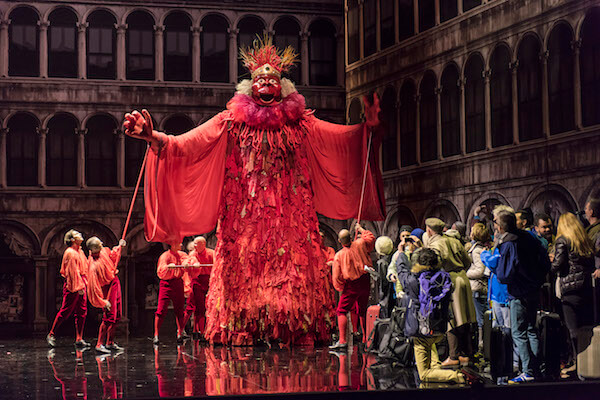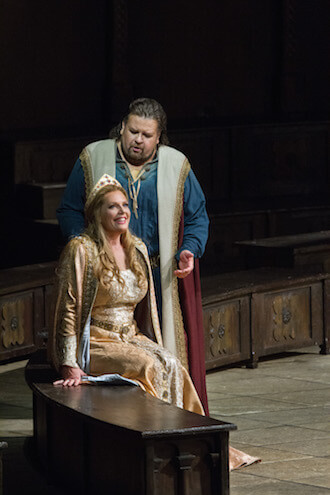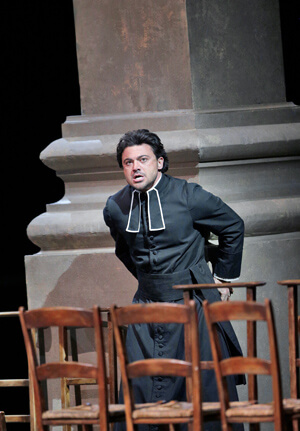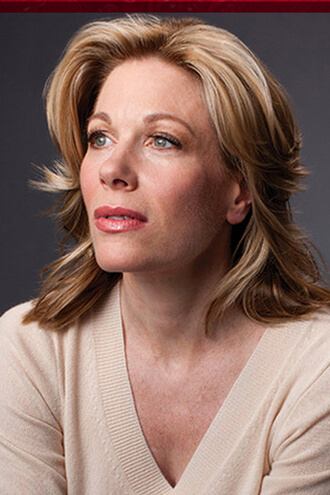Gerald Finley and Ailyn Pérez in Massenet’s “Thaïs.” | CHRIS LEE/ METROPOLITAN OPERA
Busy with several choral groups, Kent Tritle conducted the Oratorio Society’s invigorating Carnegie “Messiah” on December 18. The orchestra proved adequate if not exceptional, though trumpeter Scott McIntosh scored alongside Dashon Burton’s lively, well-projected bass-baritone in their marvelous joint aria.
This venerable amateur chorus makes an impressive sound, not always flawless in coordination but remarkably accomplished in the rollicking “And He shall purify” and “For unto us a Child is born.” We gratefully heard a fuller text than is sometimes offered, so that Part III included “O Death, where is thy sting?” and the exquisite “If God be for us” — to me essential parts of the work’s redemptive journey.
Sara Murphy presented an old-fashioned “oratorio contralto,” imposing if sometimes over-ambitious in high interpolations. Lawrence Jones offered a fine-sounding classic Handel/ Britten tenor, lithe in phrasing and expert in divisions. All four soloists ventured decorations; Jones took the prize in taste and execution. Kathryn Lewek — the Met’s, indeed perhaps the world’s reigning Queen of the Night — sometimes gleefully ventured into “Mad Scenes from the ‘Messiah’” show-off territory, but what a gorgeous, flawlessly projected sound and what technical mastery!
“Hansel and Gretel,” “Thais,” Le nozze di Figaro,” Verdi’s “Requiem” close out 2017
The Met’s holiday offering was “Hansel and Gretel” in Richard Jones’ creative if snarky staging, maybe better for adolescents than wee kiddies. Donald Runnicles, an expert Wagnerian, gave Humperdinck’s ravishing score its full due, with translucent textures and thrillingly built climaxes. I caught the “cover” cast (December 28), missing Lisette Oropesa (Gretel) and Quinn Kelsey (Peter) who sounded sensational on the broadcast. Oropesa is among the world’s great current sopranos. Her replacement, Maureen McKay, is a very good lyric soprano, a spirited performer who’s paid her dues on many stages. She belongs at the Met; her Gretel danced confidently and sang increasingly well, especially in the upper register, up to the optional D.
Ingeborg Gillebo, visually credible as a tween boy, sang pleasantly in a not-large voice finer in quality than the inexplicably prominent Tara Erraught. The Norwegian mezzo didn’t make her words clear, but then neither did the veteran American mezzo Dolora Zajick, rangy and trenchant in Gertrude’s tough music. Dwayne Croft, another veteran, remains a very valid Peter; he fared best with the text. Gerhard Siegel vocalized the Witch’s music better than most tenors and was quite droll; but why not give her music to a mezzo as Humperdinck specified? The Met has several qualified candidates signed. Still, a fine afternoon. The children’s chorus earned its fervent applause.
The Met put on a “Thais” revival largely superior to 2008’s original production. Massenet’s B-movie-level opera is beautifully composed and constructed, with an Anatole France-derived dramatic arc of two lovers missing one another on opposite traversals between lust and renunciation. (Somerset Maugham stole that for “Rain.”)
After two missed performances, Gerald Finley (Athanael) returned sounding somewhat health-challenged, but with sovereign vocal artistry in terms of voice production, verbal phrasing, and dynamics. Now 58, he made the obsessed monk at once a misguided moral force and credibly sensual. Finley is among our rare complete operatic artists.
Two decades younger, Ailyn Pérez — beautiful and likeable onstage with a ravishing soprano under ever-better if still (at the top and in trills) imperfect control — may reach that status yet. She made an attractive, compelling heroine, even if the production’s botched final scene remains a tribute to prima donna ego: Thais expires enthroned on high, as if a Byzantine imperial icon instead of a frightened girl in a shift under a fig tree.
Though not as dulcet as 2008’s Matthew Polenzani, Jean-Francois Borras brought welcome linguistic authenticity to Nicias. Deanna Breiwick (La Charmeuse), France Bellemare (Crobyle), and Megan Marino (Myrtale) sounded fresh and appealing. The only weak point was Sara Couden’s raucous Albine.
Emmanuel Villaume — always a welcome guest — led the perfumed score with consummate skill, making “Thais” a very worthwhile operatic evening. Villaume was a wise choice to take over the new “Tosca” as of December 31.
Another demonstration — were any needed — that conductors play the key role in making operas worthwhile came when Harry Bicket opened the season’s run of “Le nozze di Figaro” December 6. The orchestra flowed quite delightfully and the most capable singers flourished. These included Luca Pisaroni’s sexy, fluidly vocalized Count, the very talented company newcomer Christiane Karg (an expert Susanna), and the much-improved Rachel Willis-Sørensen’s beauteous Countess, lacking only a distinct timbral profile. Serena Malfi (Cherubino) proved decent, though unmemorable.
Pity about Adam Plachetka’s dry, charmlessly sung and acted title character. By Act Four he sounded less mediocre but this much-touted career eludes me; he no longer resembles the boyish publicity pics and there’s too much bluster and too little secure tone.
Revival director Jonathan Loy and Bicket welcomely had the comic comprimarios avoid camp and cheap “bits.” Robert McPherson (a luxury-cast Basilio) and Paul Corona (Antonio) actually vocalized their music with serious quality. With Katarina Leoson, one wondered why bother importing a vocally passé (if professional) Swede with no claim on audience nostalgia to bridge the quality gap. Hyesang Park voiced Barbarina beautifully.
As of December 29, Bicket helms another crew of leads, including Pérez as the Countess opposite Mariusz Kwiecien, Nadine Sierra, and Ildar Abdrazakov. A good late holiday gift for opera newbies; the plot’s comeuppance for sexual harassers like the Count seems timely.
Verdi’s thrilling “Requiem” — very theatrical compared to similar works by Brahms or Fauré — has been heard sporadically at the Met over the decades. This season’s run utilized three soloists intended for a sadly aborted Calixto Bieito production of “La forza del destino.” (The course of that “bad luck opera” never did run smooth.) Fair enough, but the second performance (November 27) was only sporadically worthy of Verdi — or of the run’s dedicatee, the sadly departed baritone Dmitri Hvorostovsky. James Levine has led many memorable Verdi evenings but this episodic, in places suddenly muddled traversal of the “Requiem” will not count among them. The choral and instrumental work proved consistently good but Levine’s coordination and pacing failed at several junctures.
Phraser extraordinaire Krassimira Stoyanova and the fulsome, welcomely returned Ekaterina Semenchuk provided much marvelous solo and duet singing, with usefully contrasting timbres that blended well. Any night featuring these two artists is worth attending.
Semenchuk returns opposite Roberto Alagna as the Met’s newest Santuzza on January 8, 13, and 17. Ferruccio Furlanetto at 68 still wields a remarkable bite heard live and phrases with rare intensity, yet the bass was visibly nursing a cold, so his work varied from impressive to misfired.
Aleksandrs Antonenko cannot claim artistry on his colleagues’ level. Though he managed some clean, loud high notes, his imperfect dynamic and pitch control led to some unpleasant moments, not least in his two starring opportunities, “Ingemisco” — in which his indicated trills were unfortunate — and the wannabe floated “Hostias.” Where was Russell Thomas?
Verdi’s music and the two women partially redeemed an otherwise unmagical evening. A few days later, the Met suspended its 45-year-long professional ties with Levine, long an unquestioned audience icon, due to resurfaced allegations of sexual abuse of minors. The force of destiny plays on.
David Shengold (shengold@yahoo.com) writes about opera for many venues


































